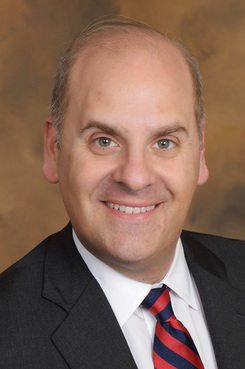Firm That Vets Lawyer-Candidates for Hire to Expand Into In-House Space
In a recent interview with Corporate Counsel, Ellenhorn talked about his role at St. Louis-based Decipher Global.
January 24, 2019 at 06:36 PM
4 minute read
 Michael Ellenhorn, co-founder and general counsel of Decipher Global (Courtesy photo)
Michael Ellenhorn, co-founder and general counsel of Decipher Global (Courtesy photo)Michael Ellenhorn, co-founder and general counsel of corporate intelligence provider Decipher Global, says too many law firms and in-house legal departments are making costly mistakes by hiring lawyers for high-level jobs without proper vetting.
Ellenhorn is a lawyer and an English solicitor who has worked over 20 years in businesses throughout Europe, the Middle East, North America and Asia. Prior to his career in executive search, Ellenhorn was a trial lawyer and legislative analyst for the U.S. Senate.
In a recent interview with Corporate Counsel, Ellenhorn talked about his role at St. Louis-based Decipher Global.
This interview has been edited for clarity and length.
Corporate Counsel: What is the size of your legal department, and what type of legal issues do you deal with?
Michael Ellenhorn: The legal department is just me, but I also rely on outside counsel. The legal issues are always a challenge, because we are in a heavily regulated industry. On a daily basis, I deal with contracts with clients, the Fair Credit Reporting Act regulations—both federal and state—as well as global data privacy regulations. For example, we specialize in investigative consumer reports. The U.S. and Canada have regulatory structures that govern the way credit agencies do their work. Outside the U.S. and Canada, there is a much more principled regulatory environment dealing with data privacy issues.
Is your company a legal recruiting firm?
No, we do not recruit, and we have nothing to do with recruiters. They are more interested in closing a deal and not in the long-term fit of the candidate. We make sure a legal job candidate is thoroughly vetted, much as companies in other industries do at the senior executive level.
We are only 3½ years old. Our team has about 50 years' experience in big law firms or in-house or other legal services. We all saw firsthand the effects of the lack of transparency in the lateral hiring of lawyers: Bad hires, requiring expensive resolutions, and negatively affecting your best people, the ones you want to invest in.
Traditionally law firms took on a crazy amount of risk with lateral hires. They acted from the gut, or based on personal relationships. The failure rate of a lateral hire was about 50 percent, meaning the hire was not there three to five years later. In contrast, our success rate is 97 percent.
Do you work with in-house legal departments as much as with law firms?
Not yet. First, we had to get the compliance piece down. Then we had to focus our resources, so we initially chose to work primarily with large law firms and had very little work in the in-house space. Now, we have grown to the point that we are starting to pivot into more involved discussions with in-house legal departments. We want to do more.
Can you explain exactly what it is that you do, and how do you do it?
There are two categories of relevant intelligence. One is open source, such as all the objective information from social media and public records, ranging from financial to criminal to personal legal history. Then there is human intelligence, which means interviewing individuals who know the candidate, such as former colleagues, opposing counsel, clients and peers. We obtain feedback on work practices, cultural fit and the fundamentals of their performance.
Doesn't a job candidate object to that kind of scrutiny?
All of our work is done with the candidate's consent. And on a fully confidential basis. We have a protocol that protects the identity of the candidate as well as the hiring entity. I can't go into detail about how we do that, because that is proprietary information.
But our job is to help people, not to harm people. So we really scrupulously guard the confidentiality and security of the person being vetted and the hiring firm. We take security very seriously. We even designed our offices so they are hard to find.
Is there anything else you'd like to add?
Our clients recognize that they have a responsibility to their staff and their stakeholders to avoid conflict, to make the working environment safe and to avoid bringing in lawyers who may have committed bad acts such as sexual harassment or criminal or financial malfeasance.
This content has been archived. It is available through our partners, LexisNexis® and Bloomberg Law.
To view this content, please continue to their sites.
Not a Lexis Subscriber?
Subscribe Now
Not a Bloomberg Law Subscriber?
Subscribe Now
NOT FOR REPRINT
© 2025 ALM Global, LLC, All Rights Reserved. Request academic re-use from www.copyright.com. All other uses, submit a request to [email protected]. For more information visit Asset & Logo Licensing.
You Might Like
View All
Looming Legal Threats, the Murdochs' Influence Make Fox CLO Vacancy Both Alluring and Terrifying
Trending Stories
Who Got The Work
J. Brugh Lower of Gibbons has entered an appearance for industrial equipment supplier Devco Corporation in a pending trademark infringement lawsuit. The suit, accusing the defendant of selling knock-off Graco products, was filed Dec. 18 in New Jersey District Court by Rivkin Radler on behalf of Graco Inc. and Graco Minnesota. The case, assigned to U.S. District Judge Zahid N. Quraishi, is 3:24-cv-11294, Graco Inc. et al v. Devco Corporation.
Who Got The Work
Rebecca Maller-Stein and Kent A. Yalowitz of Arnold & Porter Kaye Scholer have entered their appearances for Hanaco Venture Capital and its executives, Lior Prosor and David Frankel, in a pending securities lawsuit. The action, filed on Dec. 24 in New York Southern District Court by Zell, Aron & Co. on behalf of Goldeneye Advisors, accuses the defendants of negligently and fraudulently managing the plaintiff's $1 million investment. The case, assigned to U.S. District Judge Vernon S. Broderick, is 1:24-cv-09918, Goldeneye Advisors, LLC v. Hanaco Venture Capital, Ltd. et al.
Who Got The Work
Attorneys from A&O Shearman has stepped in as defense counsel for Toronto-Dominion Bank and other defendants in a pending securities class action. The suit, filed Dec. 11 in New York Southern District Court by Bleichmar Fonti & Auld, accuses the defendants of concealing the bank's 'pervasive' deficiencies in regards to its compliance with the Bank Secrecy Act and the quality of its anti-money laundering controls. The case, assigned to U.S. District Judge Arun Subramanian, is 1:24-cv-09445, Gonzalez v. The Toronto-Dominion Bank et al.
Who Got The Work
Crown Castle International, a Pennsylvania company providing shared communications infrastructure, has turned to Luke D. Wolf of Gordon Rees Scully Mansukhani to fend off a pending breach-of-contract lawsuit. The court action, filed Nov. 25 in Michigan Eastern District Court by Hooper Hathaway PC on behalf of The Town Residences LLC, accuses Crown Castle of failing to transfer approximately $30,000 in utility payments from T-Mobile in breach of a roof-top lease and assignment agreement. The case, assigned to U.S. District Judge Susan K. Declercq, is 2:24-cv-13131, The Town Residences LLC v. T-Mobile US, Inc. et al.
Who Got The Work
Wilfred P. Coronato and Daniel M. Schwartz of McCarter & English have stepped in as defense counsel to Electrolux Home Products Inc. in a pending product liability lawsuit. The court action, filed Nov. 26 in New York Eastern District Court by Poulos Lopiccolo PC and Nagel Rice LLP on behalf of David Stern, alleges that the defendant's refrigerators’ drawers and shelving repeatedly break and fall apart within months after purchase. The case, assigned to U.S. District Judge Joan M. Azrack, is 2:24-cv-08204, Stern v. Electrolux Home Products, Inc.
Featured Firms
Law Offices of Gary Martin Hays & Associates, P.C.
(470) 294-1674
Law Offices of Mark E. Salomone
(857) 444-6468
Smith & Hassler
(713) 739-1250









